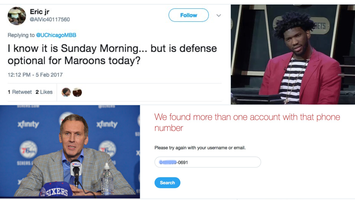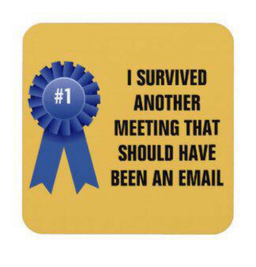 Just when we thought 2018 couldn't be more of a soap opera (or 2017, or 2016 for that matter) we get the news that an NBA executive is reported to have multiple Twitter accounts to pump himself up, leak medical information about players, and at times trash his own roster. What will happen with the 76ers, and the possibility of trying to land LeBron this summer in free agency is up for debate. But it exposes a hidden reality of leadership - putting our name with our words. Let's face it. When you're in a public role, no matter the size of the church, you're going to face critics. There will be people who don't like your leadership style, your preaching, the vision you're pursuing, or any number of other things. True story: in a previous stop I was told by someone they voted against me coming because they didn't like my haircut. With the rise of social media and its troll activity, one of the worst places for pastors to face criticism is online. Whether it comes from anonymous sources or watchdog sites or from disgruntled people with a keyboard, the instant magnification can blow up a critic's influence. And that's where we as leaders have to avoid jumping in. Proverbs 26:4 reminds us to "not answer a fool according to his folly, or you'll be just like him." I loved how Ed Stetzer always described it, that getting into social media defenses or arguments is like wrestling a pig--you both get dirty, and the pig likes it. Sadly this is a lesson we often have to learn the hard way, and recent history is filled with stories of pastors logging in to community pages as someone else to engage critics or defend themselves, only for it to end catastrophically. How can we maintain our pastoral integrity and avoid falling into the pit? 1. Unplug For A Season - Sometimes the best thing for your soul, and sanity, is to just stay off and delete the app. If you don't see it, you're not tempted to respond or reply. Sometimes ignorance really is bliss. And if you take the time to stay away, you're not opening yourself to the toxicity and cancer that can form when you're immersed in social media. *Side note - This also means that you don't need to respond or reply to every post or comment 2. Don't Hit Send - I get it, you want to fire off a response or an email. Who doesn't? But the problem is once it's out, you can't take it back. Even if you delete it. It's there. In another era, people were encouraged to write the letter and then throw it in the trash. This is the same concept: type it out. Let it fly. And then delete it. 3. Keep Perspective - A few months ago a passing comment by someone on our leadership team was taken super-seriously and led to a "meeting" where the concerned person shared the comment and how much it had bothered them. Needless to say, we had to think back to what was said because to us, it wasn't a big deal. That's the perspective you have to keep. 99% of the kerfuffle on social media is trivial. And if you engage every comment or critic on every point, you'll go crazy. But if you keep perspective it'll help you navigate. Some things do require a response and reply. Those are major issues. Answer those. Deal with them wisely and biblically. But for everything else, just ask a simple question "Will this matter tomorrow?" I'm always curious how other people handle these kinds of moments. How do you respond on social media?
1 Comment
 Earlier today for my podcast, I spent almost an hour and a half talking with one of my high school classmates about one of the most difficult and polarizing topics in our culture today: race. And it's been something I've not been able to shake in the hours since we hung up. In the evangelical circles, my observation is we typically respond to the issue of race one of three ways: 1. We pretend it doesn't exist - It's well intentioned, but we might find ourselves saying "I don't see color," or "We're past this, slavery and the Civil Rights Era are long past." 2. We are apathetic - It's not our problem. It doesn't affect our kids. It doesn't matter what happens in other communities or "in that part of town." 3. We are hostile - Sadly, there are still pockets in Christian circles that hold on to prejudicial attitudes toward minorities. And so there's outrage at kneeling, violence directed at demonstrations, or fiery rhetoric from our pulpits about troublemakers. Guys. We can't keep ignoring this problem. Our country is divided. We can blame whatever or whoever we want. It's not their fault. It's not Trump's fault. It's not the Alt-Right's fault. It's not Kaepernick's fault. It's not Obama's fault. It's not Black Lives Matters' fault. It's much deeper than blame, it's part of our fabric and history. Let me put today's conversation in this context. My friend I spent time listening to grew up in a predominantly white, middle-class community, he played D-1 scholarship football, he spent time in an NFL training camp, is a law school graduate who worked in corporate litigation. And over and over again he kept using the term "survival tactic" to share his experience being black in America in 2018. As pastors and ministry leaders, it must start with us. The division of race in America in 2018 is more than a social problem (although it is), more than an education problem (although it is), more than any of those. No, it's deeper. It's a Gospel problem. Here's how: When we read Genesis we see Adam & Eve placed in the Garden, there reflecting the image and likeness of God. In some way, they demonstrate a reflection of deity. Fast forward to Genesis 3 and the Fall corrupts everything, creation itself along with our relationships and the way we look at our neighbor. Out of that sparked the godless "curse of Ham" which was used in an evil way to justify the enslavement of millions, the genocide of entire peoples, and the attitude of white superiority through much of our nation's history. The Gospel message doesn't end with a Fall, it continues with Redemption. And Redemption isn't just where we get salvation in heaven. Redemption is where what was broken is restored. And that's where racial reconciliation becomes a Gospel issue. Our communities are broken. Our nation is broken. Every week it feels like another young black man loses his life in an unjust moment. The plight of our neighbors is ignored even when their blood on the sidewalk cries for hope. The answer is Christ. But we have a role in the redemption of our broken world. We Listen With Empathy - One of the best things we can do is talk with, and listen with empathy, our neighbors. Guys, when was the last time we listened with empathy to the women in our churches who feel undervalued, who feel like second class citizens? When was the last time we invited an African-American couple into our homes to allow them to tell us what their experiences have been like? And truly listened. Listening with empathy is not listen to respond. We listen to truly try to understand someone else's perspective. We Partner in the Gospel - It's been famously said "Sunday morning at 11 is the most segregated hour in America." And there's a lot of truth to that. Jeremiah reminds us to seek the welfare of the city. Lostness isn't a white problem or a black problem. Lostness is everywhere. Lostness is more than lostness of soul, but lostness of opportunity, of education, of benevolence and goodwill. We can partner in the Gospel with our neighbors for the sake of our communities that Jesus might get glory in everything.
Guys, I'm not trying to fix everything. I'm just wrestling with an issue we cannot afford to ignore anymore. And we can't pretend it will go away. So let's lead the way in reconciliation to our neighbors who may not look like us on the outside, but are beautifully in the image of God.
 The view outside my office is starting to transform. We're about 2 weeks out from VBS and we're seeing VBS Takeover 2018 happening. It's where our church campus becomes saturated with our VBS decorations and themes and props and t-shirts, snacks and more. I've been shooting promo videos with our music minister and I think he enjoyed yelling at me a little too much...
For one week, your church campus will be transformed with kids and families from around your community right in your backyard. People who never have set foot in your service before will be asking where bathrooms are and wondering what time pickup is. What better opportunity to serve your community and see the Gospel planted in the hearts of God's precious children.
How can you be a VBS Champion? I think you can a few different ways: Champion It in Budget & Planning - If you want to champion your church's VBS, you must start in the planning and budget phase. In many churches, pastors have great influence on the programming, ministry, and direction of the church. Recognize that you have that so that you can champion ministries that help advance the mission. VBS does that. Make it a scheduling priority so that nothing interferes with it that week. Champion It in Worship Services - The Sunday morning worship services are when the congregation is gathered, and it's during these gathering times that you can be a champion for your church's VBS. Communicate the vision. Talk about the theme. I'm taking the Sunday before VBS and preaching on this year's theme verse. Share promotional videos. Talk about how important it is to share, serve, and invest in VBS for Gospel ministry. Champion It in Conversations - I get it, VBS is a lot of work. Volunteers work long hours to do decorations, plan Bible studies, figure out how to turn popsicle sticks into a craft, and more. It's hard. It's expensive. And it can be hard to see immediate fruit. But you as a pastor need to be the champion of VBS when you're just talking to people. Diffuse criticism by pointing out the role of evangelism in the life of the church. Encourage people to serve and use their gifting. Champion It During the Week - Pastor, you're not the boss during VBS week. You are at the mercy and disposal of your church's children's minister. Be available as much as you can (yes you may have an emergency or a pastoral crisis, but this is the wrong week to be in your office hiding). Be accessible to guests and visitors. Jump in and serve however you are needed. And make sure you adopt a "Whatever It Takes" mindset where you might be serving snacks, taking out trash, or sitting and praying with a child making a major spiritual decision. You never know how God may use you that week if you're willing to jump in and serve. And don't forget, you will definitely lose the mission offering challenge. So don't be too cool to get a pie in the face or a Gatorade tub poured over you. That's part of the fun. Pastors, Gear Up! Get Ready! Game On!  Class of 2018, you've made it. You're going to have parties and cake, and one night you'll put on a silly cap and gown and get a diploma (remember, reach with the left, shake with the right). Whether you're finishing high school, college, grad school, or something else, this is a day to celebrate. You've reached an important milestone, one that will help propel you forward as you pursue God's calling on your life. Studies show that after high school graduation, 1/3 of you will never pick up a book again. If you're graduating college, it goes up to over 40%. Don't let this happen to you. Don't stop learning after your graduation. Don't stop soaking truth into your mind and letting it change your heart and life. If you're going to read anything, I want to make three strong recommendations for you. Don't Waste Your Life - I put this first because so many of us simply go through the motions and fail to see how our lives can be leveraged for the sake of the Kingdom. We're not gripped by the glory of God and it does nothing to change us to push us towards fully pursuing Christ with everything. If you're familiar, this is the book that talks about shells. Guys. I live in God's Waiting Room. And it breaks my heart to see millions of people perfectly content to play shuffleboard and drink martinis at lunch. Don't waste your life. "God created us to live with a single passion to joyfully display his supreme excellence in all the spheres of life. The wasted life is the life without this passion. God calls us to pray and think and dream and plan and work not to be made much of, but to make much of him in every part of our lives."  Just Do Something - Most of us spend our time after graduation asking the important question "What is God's will for my life?" And in response to that question we expect a Magic 8 Ball to appear or an airplane banner to fly overhead and tell us what God's special plan is for us. But what if that's not how it works? What if the call to pursuing God's will in your life is to do something, which is to pursue adulthood. DeYoung makes a striking observation that fewer people are making the transition to adulthood and instead delaying adolescence. This book is a great help to understand how to know what God wants you to do with your life, so you don't waste it.  Habits for Our Holiness - I'm thrilled to recommend this, Phil is someone I've gotten to know recently as a fellow pastor in our area. And this book is such a helpful reminder of building solid habits into our lives that push us to holiness. If you go to a Major League Baseball game, you'll still see professionals taking batting practice, fielding ground balls, and playing long toss just like they have since Little League. Why? Fundamentals matter. For us as Christians, the spiritual disciplines are the fundamental exercises of our faith. So we never mature beyond needing to spend time in the Word, spend time in prayer, be faithful in worship, refresh through rest, engage in meaningful fellowship, and more. What other books would you recommend to the Class of 2018?  Maybe you do. For most of us, our time in seminary was a dance (or interpretive movement if you're Baptist) between school, family, church, and work. We had to learn how to navigate the demands for our time between competing priorities, always working to make sure that we did our best. But it's not always that pressure cooker. And when we find ourselves serving in ministry we won't be finding ourselves working with a schedule printed on a wall. I loved that when I worked Retail in college and seminary. I knew when I'd be working, what time, who with, what time I'd be getting off, and how many times I'd be getting up at 4am to open the store. I've never seen a time clock since I've been in vocational ministry. But we must manage our time well if we're going to be faithful and fruitful in our calling. Prioritize - As a senior pastor, Sunday comes every 7 days whether I like it or not. And every Sunday I've got to be ready to preach. So there's a priority to ensure that I've spent adequate time preparing and studying to be ready for Sunday. Some people take a whole day to write and study, others take time throughout the week. Whatever they do, they must make it a priority. But managing time doesn't stop with one priority. You need to balance a number of them. You'll need to prioritize time to prepare for the meetings you have, the luncheon you're attending, etc. Block Your Time - The best way I've found to schedule my day has been to work it in a sequence of time blocks. I do my calendaring on my computer, so if interruptions or emergencies happen and I have to rearrange my schedule, all I have to do is slide the blocks around to make them work. And sometimes that block gets slid to tomorrow. I've found the best way to block is 15/30 minute increments. It allows a lot of freedom and mobility in case things need changing. Communicate - Nothing is more awkward than someone looking for you and for no one to know where you are and what you're doing. If you have a good assistant, they'll cover for you, but that's not managing your time well. Communicate when you'll be in the office, when you'll be working off site (I'm spending time today with the patron saint of sermon preparation, St. Arbucks), when you'll be making visits, when you're off, when you're out of town, etc. Limit Distractions - The constant ding of our email or Facebook can be an ongoing distraction. Close the window. Put your phone on silent. Turn off push notifications. One thing I've found helpful is scheduling email time, and my mail program stays closed until that time. I've also set my phone up to show the text on the screen so I can know if it's something to deal with now or later (hint - your spouse is always a "now" to deal with). It's not perfect. But when you have the attention span of a squirrel, it takes some planning! Be Accountable - We're accountable first to God for the way we use our time, second to our family, and third to our church. If we find ourselves misusing our time and not working hard (or the opposite and becoming a workaholic - I talked to one guy yesterday who said his church was proud of its pastor having a heart attack and coming back to the office), we're going to be out of rhythm and one of our accountability systems needs to step in. If you're spending too much time at work, let your family speak into your life. If you're spending too little time working, let your leadership and godly counsel speak into your life. Finally, be sensitive to God's accountability in your life with how your time is managed. How have you managed your time well in ministry?  If you're serving as a lead pastor or overseeing a larger department, you're probably responsible for the process of hiring and developing staff members. It can be incredibly intimidating to be the one who has to decide who gets a job, or worse if you have to separate someone from their job. Seminary teaches us a lot about leadership principles and management, but sometimes we have to learn through experience the process of staffing ministries and our churches. Above all else, let me encourage you to strive towards a team mindset in staffing. It's really easy to just accumulate people and hope it works out. But leadership is a lot of culture setting, and that's where we can develop healthy teams. In my book Dream Teams, I believe in 4 key aspects: Calling, Character, Competency, and Chemistry, in developing a team. Many times we just have a group, where everyone works alongside each other but not together. See the difference? One exists, the other thrives. It's possible to have a team mindset among your staff. But it means you have to work hard to cast vision, invest in people, build systems, and harness synergy. All of those are much harder than simply filling needs. But it's in these that far too many ministries stagnate because they just have people on the bus, not (as Collins says) "the right people in the right seats." Taking each of those, how can we strive for a team mindset? Calling - We build a team of people who love what they're doing. When you're hiring, identify people who have a particular calling to the work you're seeking. Our ministry assistant rose to the top during the interview process when she said she felt her work was a ministry, not just a job. That stood out among other (very qualified) candidates. She loves what she does. We need to make sure the people we bring on and develop love what they're doing. If not, we have to ask ourselves two questions: 1) Can I help them find the right fit here? 2) Is God beginning to call them elsewhere? Character - We build a team of people who we can trust. In the book I have a long list of key qualities people should have in order to be a good fit on a ministry team. And it's important to make sure we put character before competency. Who you are > What you can do. We have to surround ourselves with people of integrity, people we can trust with money, people who are capable of handling sensitive situations well, people who have a strong track record and work ethic and credit score. Competency - We build a team of people who are good at what they do. It's important that we make sure character > skills, but we can't overlook the importance of skills. We need to make sure that those we bring on board or develop have the necessary ability to do the work they're expected to. For a critical ministry staff role, we asked a candidate how they would share the Gospel with a child. Their answer was all over the map, and they didn't get the position. When we're doing our annual evaluations, we need to identify areas of strength and weakness. The good news? Competency can be learned. It can be improved upon. So if you have someone lacking in some needed skills, get them some training, surround them with coaching, and identify a mentor who can work alongside them. Chemistry - This is where it's always important to make sure you're bringing other people into any decision about hiring. You can have blind spots that others may not. Our church's bylaws make sure that no hiring decision is made in isolation. A search team of 5 have to be on board with a ministry candidate, and a hiring team of 3 have to be on board for a support position. Why so many voices? Because fit matters. We want to make sure that the people we have on board get along, enjoy working together, have a good rapport, and interact not only professionally but Christianly. In the book, I make the point that Chemistry = Friendship, Unity, and Trust. Ministry leader, more than just for hiring, these principles are important as you develop the team around you. But you can't do that without spending time with them. Do daily check-ins, do weekly/monthly conversations. Make sure you're listening as much as you're talking. Help your team keep their eye on the main thing, and in everything you do remember that your charge to steward God's church well means that you need to steward God's laborers well.  I know. You probably took a preaching class (or multiple) in seminary. But our preaching classes in seminary are only the first step in a lifetime of ongoing learning about how the Word is rightly exegeted, understood, and applied in our churches. For one, our seminary preaching labs are often built to resemble churches, complete with pulpits, and with a camera to record you for grading (or destruction) later. True story, this was a chapel at the seminary I went to with its awesome elevated preaching platform. Your time in seminary should be an incredibly intense time of exegesis, learning the technical aspects of digging into a text to find what its meaning is and how that meaning, seen through the lens of the Gospel, applies to us. You should read big books on preaching, read and listen to good sermons, and work hard to learn how to navigate multiple genres of biblical text (hint: you can't live all your ministry in Paul). Those are invaluable skills that are refined and learned in the crucible of seminary. But there's so much about preaching that you'll never learn in a seminary preaching classroom. You'll learn to weep over people's trials in your preparation - The biggest difference between preaching a text in a seminary classroom and preaching in the local church is you're speaking directly into the lives of people you're serving and ministering alongside. As you prepare and study for each Sunday, you'll find yourself drawn to certain people going through circumstances the text speaks to. This Sunday I'm preaching on anxiety and worry from Matthew 6, and I've spent time with someone worked up and anxious. It's pushed me to pray for them as I've reflected and prayed. You'll learn to plan and prepare preaching in series - Expository preaching is often the best diet for a local church, the regular feeding from the Word preached verse-by-verse through lengthy chunks. So your series can be going through an entire book of the Bible, working through significant portions (Sermon on the Mount), or even doing surveys of books of the Bible (covering books like Exodus or 1-2 Kings in a span of 10-12 weeks for example). Series help you shape what you feel like God is wanting your church to hear. Even topical series, which are still incredibly valuable, provide a systematic way of developing godliness among your people. You'll learn to calendar in advance - I know a lot of guys in ministry who go week to week deciding what to preach on. I served with one pastor who I remember asking on Thursday afternoon what he was preaching on (so I could weave it into our youth group opening that day). He said he didn't know, and I think I had a mild heart attack. But when you are in the weekly (and monthly and yearly) process of preaching regularly, you'll learn to structure your messages. Each year I know I'm going to have a few special emphases, I'll take a week in the beginning of the year to cast vision, I'll preach in October about deacons as our church elects new ones, I'll do a 4 week Christmas series, and I know I'll be out a couple Sundays for vacation. Developing a calendar helps me plan around these benchmark moments in the church calendar (I don't do Mother's/Father's Day or July 4 messages, you might and that's ok). You'll learn to lay an egg and move on - When you're preaching for a grade, you get a limited number of chances. So it needs to be strong. It needs to be crisp. When you're preaching 45-50 Sundays a year, the law of averages says you're going to have a dud. It might be after being sick for a week, or after a busy season, or just one of those days where the illustrations are flat and you're watching the clock more than anyone else. When you're preaching week in and week out, it'll happen. Move on. And when you lay an egg, that's sometimes where God speaks most strongly to people because when we lay an egg, it's the reminder that it's not about us. You'll learn to manage time better - Effective ministry is often the wearing of many hats. You're a leader, a visionary, a janitor, a counselor, available labor (I got drafted once into climbing a ladder to cut a palm tree--not what I'd envisioned for a Monday). And the regular practice of preaching forces us to remember that no matter what we might be facing in the week, Sunday will come exactly every 7 days. When we're preaching regularly, we're finding ways to grow in how we manage our time, prioritize our preparation, schedule our meetings, and commit to extra appointments. Pastor, what's something you learned after seminary about preaching? A lot has been written about what we learn or didn't learn in seminary. I loved my time working on my M.Div. and doctorate. It was an incredibly fruitful and edifying process. But it wasn't complete. It's not supposed to be complete. You don't learn pastoring just by going to seminary. You learn exegesis, hermeneutics, theology, languages, philosophy, homiletics, historical theology, missiology, and more in seminary. But the actual practice of ministry is something that can only be learned on the field. I'm incredibly thankful for the practical coursework I had, but the best on-job training for ministry comes by actually doing ministry.
One thing that seminary can't prepare you for fully are hospital visits. You can read about visits, hear from experts about how to do a gracious and encouraging visit, and even do case studies about hospital visits. But nothing replaces actually doing visits. And when you do visits, you'll learn way more than you could have ever imagined in seminary. You'll learn way more about your church members - Something happens to modesty in the hospital, it's left at the door. There's no telling what you'll see, or smell, from people you see on Sunday mornings when you visit them in the hospital. You might also hear them tell more about their procedure or sickness than you ever care to know. But as a shepherd, you love your people whether they're in the Sunday best at the visitor center or in their hospital gown talking about their catheter being too tight. You really do have a ministry of presence - Hospital and nursing home visits are less about what you say and more about you being there. Many who are in long-term care have no visitors, even family. Your presence there is possibly their only non-clinical human contact in a day. Just by being there, you're able to minister greatly to the one in the bed. So don't worry if you don't have the right words to say in the right moment. If all you do is speak a word of prayer, read Scripture, and hold their hand, you've done more than you can imagine. You can bless not only the patient but the staff - A few months ago I did a visit at the ICU where the patient was brain dead, and they were awaiting the family's approval to remove life support. The nurses and doctors who work in those situations see death happen every day, and it's never easy to watch a wife say goodbye to her husband of 50 years, or a mother say goodbye to her child. Thank them for the work they do, and assure them of your prayers for not only the patient but for them. You're going to have some stories - Every pastor has had one kind of funny/awkward hospital visit where you just have to laugh and keep your head about you. Just walk out and go "I should write about this." I've been shown scars, seen full bedpans, fed someone who couldn't do it themselves, been mooned by an open hospital gown, and been asked to photograph a trauma victim for a possible lawsuit. What have you learned from doing hospital or nursing home visits?  I have yet to ever meet anyone who enjoys meetings. Well, anyone sane who enjoys meetings. Unfortunately, we've created a culture where meetings have become a necessary evil, and at the core of a lot of our disdain for meetings is that we've been to far too many meetings that were absolute time sinkholes. A time sinkhole is where time disappears because it was wasted. Wasted time in meetings causes people to be frustrated, knocks out any momentum that could be generated, and fosters a general apathy towards meetings. Meetings can be times of generating ideas, creating action plans, and making sure leadership is all on the same page. But too often we create time sinkholes, here are 7 ways to avoid them in meetings. 1. Have an agenda - Meetings without a plan quickly disintegrate into gripe sessions or aimless wandering through rabbit holes. Agendas have a clear plan of action, specific talking points, and keep everything flowing for the meeting. Agendas keep meetings from chasing tangents because they clearly lay out the objectives, so that everyone stays on task. 2. Start (and end) on time - Meetings shouldn't just have a start time, they should have an end time. And unless there's lengthy strategy or brainstorming, meetings shouldn't take longer than 30-45 minutes if you're sticking to the agenda. The people who attend your meetings are giving up their time to attend, and they have lots of other things they're busy working on. Respect their time and steward it well. If the meeting begins at 2 and is slated to be over by 2:45, end at 2:45. If you don't cover everything, do a follow-up correspondence.  3. Don't talk about things that could be an email - All of us have sat in meetings where endless discussion happened on things that could have been quickly covered in an email. The only things that need to be talked about in a meeting are the things that require a meeting. Anything else, send it in an email before or after. That's the argument from Read This Before Our Next Meeting, where meetings have a specific purpose and function - to generate action. 4. Have an action plan - If at the end of the meeting you've got nothing you're doing as a result of the meeting, congrats... you wasted everyone's time. No meeting should ever end without clear action plans that flow from the discussion. An action plan includes a point person, a specific task, and a timeframe for completion. 5. Facilitate discussion well - If you're leading a meeting, you're setting the pace. Discussion is important, but as the leader you have the responsibility to steward and shepherd the discussion well. Make sure it stays on point, contributes to the discussion, and then when the dead horse has been beaten enough, you bring it to an end. 6. Expect punctuality - All of us have things that keep us from being on time. A few weeks ago I got snagged in another appointment and left a guy hanging for 30 minutes while I was trying to get away. But these should be the exception rather than the rule for us. If we're going to do meetings well, we should expect punctuality. Extenuating factors can certainly be considered, but someone just "not being able to make it on time" is unacceptable. 7. Keep the main thing the main thing - A meeting should have a single purpose, keep the focus on that. Always keep coming back to the main thing. If you're in a planning/strategy meeting for VBS, this isn't the time to discuss the Wednesday Potluck. If you're planning the worship service for Sunday, don't tack on discussion about facility usage. Drawing everything back to the purpose for the meeting ensures that you not only have the time needed to discuss, but also the attention of everyone there to make sure it's a fruitful meeting. What have you done as a leader to avoid Time Sinkholes?  Earlier today I took our minivan through an automatic car wash, and got frustrated by how long it took. I caught myself saying "Unbelievable, why is it taking 10 minutes!" Like that's a really big deal. I think too often in ministry we find ourselves taking the short view of things, rather than the long view. The short view is where we expect changes to happen overnight, for lasting culture to be changed in a week, for vision to be captured and implemented off one meeting. Or we look at the attendance one week to the next and determine "We're growing!" or "We're doomed!" But pastoral ministry isn't a microwave, it's a CrockPot. It's something that develops and matures after years of faithful labor, prayers, sweat, and effort. It's something that happens long range, that's hard to measure on a micro scale. So how can we as pastors and ministry leaders take the long view? 1. Commit to a Long Tenure - The average tenure for a pastor is 3-5 years, for a youth minister 18 months, for other positions 2-3 years. The common denominator: no one sticks around long enough for the long view to take shape. We can't control what God may do in calling us to another ministry, but we can commit to ourselves that we'll endure through difficult times to see lasting fruit on the other side. 2. Don't Make Unfair Comparisons - It's easy for us to look week to week in attendance or giving numbers and make the jump to say things are growing or things are doomed. But rather than look week to week, look at month to month compared across years. Where we live in Florida, we have a unique demographic with the snowbirds. So I look at comparative attendance during our summer months (May-September), our first Snowbird Migration (October-December) and the second Migration (January-April). 3. Bad Sundays Will Happen, Roll With Them - Sometimes you'll have a day where your attendance is down, giving is down, key families weren't there, your message felt like a flub, and more. They happen. Roll with it. Don't beat yourself up. Don't write a resignation letter on Monday morning. You're going to have a bad Sunday. But they're not cause to give up. Instead, brush off and make the next Sunday better! 4. Avoid Apples & Oranges - Your church isn't your friend's church. Your church isn't like the church across town. Your church isn't the megachurch with the slide in the children's area. Your church is unique, and it's not fair to compare what you're able to do (or not able to do) with the other churches in your area. God's called you to be faithful, to shepherd and serve well, and to lead your church towards the vision God has for you. He's not called you to be <Insert Church Name Here>. 5. Don't Get Frustrated - You can lose weight by going on a crash starvation diet, or you can lose weight by gradually dropping pounds through calorie control and exercise. Guess which one is healthier for you. It's the same way in the church. You can get frustrated when things don't happen as quickly as you'd like, or the changes you feel are important to the vision aren't received immediately. But that's where the long view comes in. That's where the long view of leading with kindness, teaching and preaching faithfully, and strategically praying all come in to help gradually, over a lengthy tenure, see changes happen that make a church more fruitful and faithful. Pastor, how have you taken the long view in your ministry? |
Scott M. DouglasA blog about leadership and the lasting legacy of family ministry. Archives
August 2023
Categories
All
|
 RSS Feed
RSS Feed



